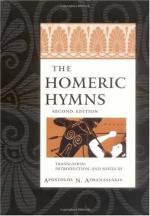Greek religion, Greek myth, are vast conglomerates. We find a savage origin for Apollo, and savage origins for many of the Mysteries. But the cruelty of savage initiations has been purified away. On the other hand, we find a barbaric origin for departmental gods, such as Aphrodite, and for Greek human sacrifices, unknown to the lowest savagery. From savagery Zeus is probably derived; from savagery come the germs of the legends of divine amours in animal forms. But from barbarism arises the sympathetic magic of agriculture, which the lowest races do not practise. From the barbaric condition, not from savagery, comes Greek hero-worship, for the lowest races do not worship ancestral spirits. Such is the medley of prehistoric ideas in Greece, while the charm and poetry of the Hymns are due mainly to the unique genius of the fully developed Hellenic race. The combination of good and bad, of ancestral rites and ideas, of native taste, of philosophical refinement on inherited theology, could not last; the elements were too discordant. And yet it could not pass naturally away. The Greece of A.D. 300
“Wandered between two worlds,
one dead,
The other powerless to be born,”
without external assistance. That help was brought by the Christian creed, and, officially, Gods, rites, and myths vanished, while, unofficially, they partially endure, even to this day, in Romaic folk-lore.
HOMERIC HYMNS
HYMN TO APOLLO
[Silver stater of Croton (about 400 B.C.). Obv. Hercules, the Founder. Rev. Apollo shooting the Python by the Delphic Tripod: lang103.jpg]
Mindful, ever mindful, will I be of Apollo the Far-darter. Before him, as he fares through the hall of Zeus, the Gods tremble, yea, rise up all from their thrones as he draws near with his shining bended bow. But Leto alone abides by Zeus, the Lord of Lightning, till Apollo hath slackened his bow and closed his quiver. Then, taking with her hands from his mighty shoulders the bow and quiver, she hangs them against the pillar beside his father’s seat from a pin of gold, and leads him to his place and seats him there, while the father welcomes his dear son, giving him nectar in a golden cup; then do the other Gods welcome him; then they make him sit, and Lady Leto rejoices, in that she bore the Lord of the Bow, her mighty son.
[Hail! O blessed Leto; mother of glorious children, Prince Apollo and Artemis the Archer; her in Ortygia, him in rocky Delos didst thou bear, couching against the long sweep of the Cynthian Hill, beside a palm tree, by the streams of Inopus.]
[Leto. With her infants, Apollo and Artemis. From a Vase in the British Museum. (Sixth Century B.C.): lang104.jpg]




